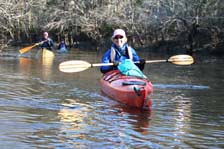Both Chamber of Commerce Chair Myrna Ballard and Lowndes County Manager
Joe Pritchard say the VDT is inaccurate.
The VDT took offense at Ballard’s assertion.
Which do you believe?
 I believe I’d like to see the evidence, not just the VDT’s assertions.
And this junior high school cat fight the VDT insists on is not
helping fix the real problem with water and wastewater in Valdosta
and Lowndes County: the widespread and longterm damage to our watersheds
that turned a normal rain in 2009 into a 700 year flood, and caused
another flooding of the Withlacoochee Wasterwater Treatment Plant this year.
I’m all for investigative reporting, but I have not yet once seen
the VDT investigate the real underlying issues of longtime clearcutting
and building of roads subdivisions, and parking lots without adequate
consideration of water flows.
I believe I’d like to see the evidence, not just the VDT’s assertions.
And this junior high school cat fight the VDT insists on is not
helping fix the real problem with water and wastewater in Valdosta
and Lowndes County: the widespread and longterm damage to our watersheds
that turned a normal rain in 2009 into a 700 year flood, and caused
another flooding of the Withlacoochee Wasterwater Treatment Plant this year.
I’m all for investigative reporting, but I have not yet once seen
the VDT investigate the real underlying issues of longtime clearcutting
and building of roads subdivisions, and parking lots without adequate
consideration of water flows.
The VDT front page today has yet another story attacking the City of Valdosta,
Loan info from GEFA contradicts City:
$11 million awaits disbursement, loan amounts don’t match.
I can’t make much sense out of it, because while Jason Shaefer has
dug up a lot of interesting information, he doesn’t include dates
for much of the financial detail he attributes to GEFA.
Let’s see the VDT publish the documents they are referring to.
The city does publish its
Comprehensive Annual Financial Reports.
The VDT has a website, and could publish whatever records
it got from GEFA, which after all were produced using our tax dollars,
and are therefore public records.
Or if the documents are somewhere on
GEFA’s website, the VDT could publish links to the specific documents.
The VDT did publish
a timeline of correspondence with the City about loans,
so it could just as easily publish the GEFA documents and its
own page-by-page and chart-by-chart comparison so we could all see
for ourselves.
The VDT prepended this blurb to its timeline:
It has come to the attention of the Times that the Chamber of
Commerce has called a special meeting on Tuesday to address what COC
Pres. Myrna Ballard terms as “damage to our community’s
reputation” due to the stories that have appeared in the
newspaper. The invitation for the 9 a.m. meeting at the Chamber
office was extended to only a select group of Chamber members, no
media, and states that Mayor John Gayle and City Manager Larry
Hanson will explain the city’s financial status. The Times takes
very seriously the implication that the newspaper has written
anything that is “inaccurate,” as stated by the Chamber.
As such, the Times has chosen to show the public the information
provided to the newspaper in response to questions posed to the
City, with no editing, to allow citizens the opportunity to see for
themselves if what the Times has written is an
“inaccurate” portrayal of the city’s financial status.
What was that again?
The Times takes
very seriously the implication that the newspaper has written
anything that is “inaccurate,”
as stated by the Chamber.
How about as stated by Lowndes County Manager Joe Pritchard?
In
a letter from him to me of 29 January 2013 Pritchard stated:
Continue reading →
 The day after the VDT ran
Lowndes County’s admission that the sewer line break was theirs, not Valdosta’s,
did the VDT start a series of financial investigation
like they did about Valdosta’s water issues?
Nope, they ran a piece about how much weather costs the county,
with no recognition of watershed-wide issues,
nor of any need for the county to participate in proactively
dealing with them, to reduce costs, for better quality of life,
to attract the kinds of businesses we claim we want.
Nope, none of that.
The day after the VDT ran
Lowndes County’s admission that the sewer line break was theirs, not Valdosta’s,
did the VDT start a series of financial investigation
like they did about Valdosta’s water issues?
Nope, they ran a piece about how much weather costs the county,
with no recognition of watershed-wide issues,
nor of any need for the county to participate in proactively
dealing with them, to reduce costs, for better quality of life,
to attract the kinds of businesses we claim we want.
Nope, none of that.
In the Deep South, near a river plain where floodwaters rise and ebb from season to season and wetlands that distinguish the region from anywhere else in the nation, flooding makes a significant portion of the concern for Lowndes County emergency management.











